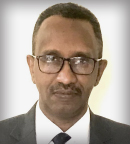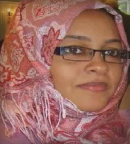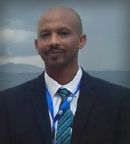
Ahmed Elhaj, MD

Nada Suliman Haj Mukhtar, MD

Moawia Mohammed Ali Elhassan, MD
Sudan is the third-largest country in Africa, spanning 1,886,068 km2. It is situated in an area surrounded by North Africa, Sub-Saharan Africa, and the Middle East. As of 2020, Sudan had a population of approximately 43.8 million people, with a significant proportion being younger than age 15. Despite having abundant natural resources, Sudan is considered a low-income country, with approximately half of its population living below the poverty line.
Since gaining independence in 1956, Sudan has faced ongoing conflicts and civil wars that have greatly impacted the accessibility of health services across the nation. This has resulted in limited health-care provision in many regions for an extended period. Even in areas where health-care services are available, primarily in larger cities, the quality of care is far from optimal.
Cancer and Its Treatment in Sudan
In Sudan, as in most Sub-Saharan African countries, cancer is recognized as a serious health problem. Cancer treatment in Sudan is mainly provided by the Khartoum Oncology Hospital in the Khartoum State, the National Cancer Institute (NCI) in the Gezira State, and the Shendi Oncology Center in the River Nile State, along with eight cancer treatment units attached to state hospitals; however, these units provide chemotherapy services alone. There are also private oncology centers that provide chemotherapy services at a cost that is unaffordable for many patients, all of which are in the capital Khartoum.
Breast cancer is the most common cancer among women in Sudan, with approximately 40% of cases being diagnosed as advanced disease at presentation.1,2 This pattern is similar to that in other Sub-Saharan African countries, where 40% to 90% of women with breast cancer, particularly those in the younger age group, present with stage III or IV disease.3,4
Resources for diagnosing breast cancer in Sudan are mainly available in Khartoum, Wad Medani (the capital of the Gezira state in central Sudan), Shendi (in Northern Sudan), and Port Sudan (in the eastern part of the country). However, these resources are not evenly distributed across the country.
“Cancer treatment centers outside the capital are experiencing a shortage of chemotherapy supplies, supportive treatment, and materials necessary for cancer diagnosis.”— AHMED ELHAJ, MD, AND COLLEAGUES
Tweet this quote
Khartoum has three functioning mammography units, whereas the other cities have one unit each with irregular services. Outside these areas, ultrasound is the main tool for assessing breast lesions. Ultrasound-guided biopsy is available only in Khartoum. In other parts of the country, incisional biopsy or cytology is the standard of care. Histopathology services are available mainly in Khartoum, Wad Medani, and Algadarif (in the eastern region of Sudan), but immunohistochemistry tests are offered only in Khartoum. Chemotherapy is provided free of charge at the governmental cancer treatment hospitals, although shortages of certain agents are common.
There is a significant shortage of radiotherapy units in the country. There are only two state-owned functioning radiotherapy units: one in the Khartoum Oncology Hospital and the other in the National Cancer Institute in Wad Medani. Both units are equipped with cobalt-60 machines. Additionally, there are two private radiotherapy centers, both equipped with modern linear accelerators. One is in Khartoum, and the other is situated in Merowe (in the north of Sudan).
Cancer Services During Wartime
On April 15, 2023, a war erupted between Sudanese Armed Forces and Rapid Support Forces in the capital of the country, causing a devastating impact on health-care services. This war has created a difficult situation for all patients in the country including those with cancer. Moreover, the Central Medical Supply Fund, which is in Khartoum and is responsible for securing the supply chain for medical equipment, medications, and blood products, is inaccessible.
All cancer treatment facilities in Khartoum, including the largest state-owned hospital (Khartoum Oncology Hospital), have completely stopped operation. This hospital once treated more than 10,000 new patients with cancer annually. Also, the Khartoum Breast Care Centre (KBCC), which is the largest nonprofit, privately funded organization and the only specialized and multidisciplinary breast cancer center in Sudan, has stopped operation. KBCC once treated 20% of all patients with breast cancer in Sudan.
The Khartoum Oncology Hospital incorporates all the relevant specialties—imaging, pathology, surgery, and oncology—in one building, which leads to effective care, treatment, and recovery for patients. As a result, there are currently no available medical services for patients with cancer in Khartoum. Furthermore, cancer treatment centers outside the capital are experiencing a shortage of chemotherapy supplies, supportive treatment, and materials necessary for cancer diagnosis. Additionally, power outages in these centers not only pose a threat to the safety of chemotherapeutic agents requiring specific conditions for storage, but also disrupt the operation of radiotherapy machines.
“This war has created a difficult situation for all patients in the country including those with cancer.”— AHMED ELHAJ, MD, AND COLLEAGUES
Tweet this quote
Many patients with cancer from Khartoum have chosen to leave the city and seek treatment in nearby governmental centers. The primary cancer treatment center outside Khartoum is the National Cancer Institute in Wad Medani, located 200 km southeast of the capital. This institute has become the preferred option for most patients with cancer from Khartoum, as it provides both chemotherapy and radiotherapy services. However, this institute is currently overwhelmed, as the number of patients seeking cancer treatment exceeds its capacity in terms of space, personnel, and resources. Originally designed to accommodate 50 patients in outpatient clinics per day, 50 to 60 patients for day-care chemotherapy administration, and approximately 60 patients in its wards, the institute is struggling to meet the increasing demand.
Until June 18, 2023, the NCI’s statistics and records unit recorded a total of 2,217 new patients, compared with 1,399 new patients during the same period this past year. This increase in new patients receiving anticancer treatment has had a detrimental effect on the institute’s already strained services. For example, almost all chemotherapeutics have been consumed, and tamoxifen is the only hormonal therapy currently available for patients with breast cancer. To make the situation even worse, one of the two radiotherapy units is out of order, mostly likely from the huge demand for its service.
Efforts to Meet the Challenges
Many efforts have been made to address the challenging situation in Sudan. They include recruiting more health-care professionals, especially senior consultants, who were displaced from Khartoum as volunteers to provide care to patients. Discussion groups have also been established, involving oncologists and other stakeholders, to facilitate an exchange of ideas on how to improve this drastic situation. Additionally, telemedicine technology has been used to reach patients in areas with restricted access to provide consultation and monitoring.
These efforts are plausible. However, unless practical steps are taken to make necessary resources available as soon as possible, we are afraid the situation is heading toward a crisis for patients with breast cancer specifically and for all patients in general. Nongovernmental organizations and international organizations such as the World Health Organization, ASCO, and the African Organisation for Research and Training in Cancer, along with their associated societies and members, can collaborate with local institutions to facilitate delivery of medical supplies, equipment, and essential medications to the region in need. This collaborative effort aims to ensure continuity of the health-care services in the face of logistical challenges.
DISCLOSURE: Drs. Elhaj, Mukhtar, and Elhassan reported no conflicts of interest.
REFERENCES
1. Eltayeb MA, Faggad A, Abbadi OS, et al: Characteristics of breast cancer at first presentation in Sudanese patients attending the National Cancer Institute–University of Gezira. Arch Breast Cancer 7:104-110, 2020.
2. Elgaili EM, Abuidris DO, Rahman M, et al: Breast cancer burden in central Sudan. Int J Womens Health 2:77-82, 2010.
3. Brinton LA, Figueroa JD, Awuah B, et al: Breast cancer in Sub-Saharan Africa: Opportunities for prevention. Breast Cancer Res Treat 144:467-478, 2014.
4. Balogun OD, Formenti SC: Locally advanced breast cancer—Strategies for developing nations. Front Oncol 5:89, 2015.
Dr. Elhaj is Lead Oncologist and Clinical Director of the Khartoum Breast Care Centre in Sudan. Dr. Mukhtar is Consultant Histopathologist at the Khartoum Breast Cancer Centre. Dr. Elhassan is Consultant Clinical Oncologist at the National Cancer Institute, University of Gezira, Wad Medani, Sudan.

